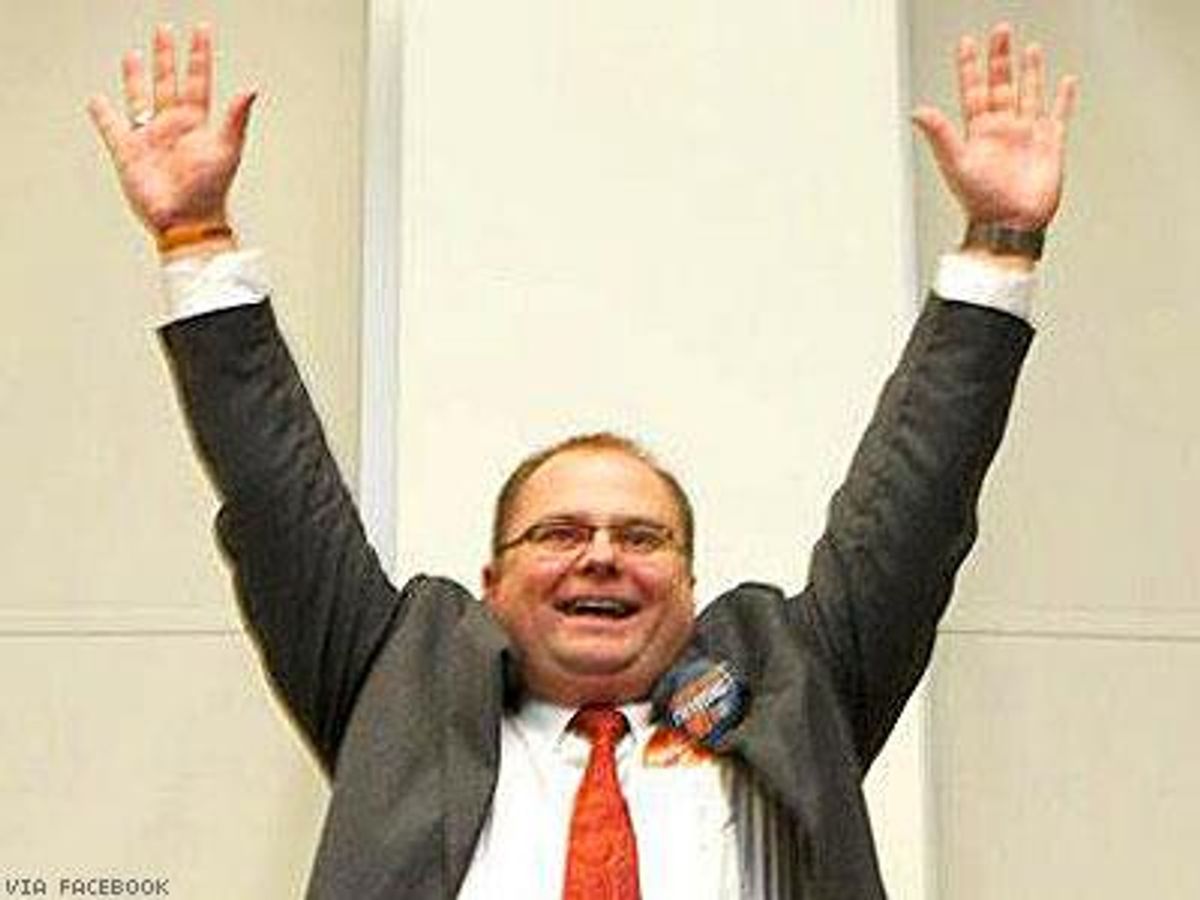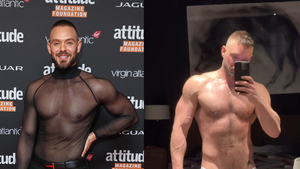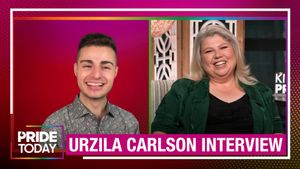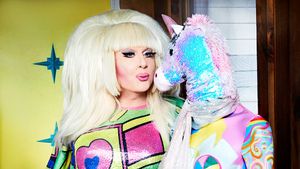Last November, Minnesotans broke a crucial losing streak for LGBT Americans. For the first time ever in the United States, voters rejected a constitutional amendment that would have outlawed same-sex marriage. Then six months later, they pressed onward and Minnesota Gov. Mark Dayton signed marriage equality into law.
At exactly midnight, gay and lesbian Minnesotans began marrying their partners in ceremonies in Minneapolis that were officiated by Dayton, the city's mayor, and local judges who volunteered their time to solemnize the marriages. As couples find their wedded bliss across the Land of 10,000 Lakes, the man widely credited with engineering this historic shift is settling into a new job as director of state campaigns with Freedom to Marry, ready to take his tactics nationwide.
The right-wing has reason to worry about Richard Carlbom, a 31-year-old gay man who was born and raised in Minnesota. Immediately after graduating in 2004 with a degree in political science from St. John's University, Carlbom was elected mayor of neighboring St. Joseph, Minn. Fondly known as St. Joe, the town of 5,000 has a history of electing youthful mayors, which it continued by electing Carlbom -- who was just 23 when he took office. From that appointment, Carlbom went on to work for U.S. Rep. Tim Walz; in 2011, he became the communications director for St. Paul mayor Chris Coleman, according to CityPages.
The following year, Carlbom applied for a position as the campaign manager for a then-fledgling coalition known as Minnesotans United for All Families.
"We knew we needed to have a very strong board that would then have a very strong campaign manager to run the day-to-day operations," explains Cristine Almeida, who served as the board chairwoman for MN United and oversaw Carlbom's hire. "And that's exactly what Richard was."
As the campaign manager for MN United, Carlbom helped build the largest grassroots campaign in Minnesota history -- engaging more 70,000 volunteers and raising almost $13 million -- mostly through small donations made by individuals inside the state, according to the organization.
So what was it about Minnesota, a region deep in the heartland that many coastal progressives dismiss as a flyover state? How did the state that gave the world Michele Bachmann also become the 12th to legalize marriage equality?
Carlbom credits the numerous organizations that joined forces to create the coalition behind Minnesotans United for All Families. But he also stresses an important shift in the way marriage equality advocates approached the subject with Minnesotans.
"In the past we spent a lot of time talking about rights and benefits and discrimination, and protecting the constitution," explains Carlbom. "And in Minnesota, what we discovered is that Minnesota's definition of marriage is love and commitment, which when people follow love, the next natural step is to make a commitment toward one another to get married. And in Minnesota, we discovered that when we had an honest conversation, and when we had a natural conversation with each other, very quickly, both came to realize that same-sex couples want to get married for very similar reasons as straight couples. That's because it's all about love."
But that wasn't the end of the conversation, Carlbom explains. Using research culled from national and local partners, the MN United coalition had a very specific plan: Once they had established a common definition about the meaning of marriage, Carlbom and his allies relied on an age-old adage to illustrate why voters should oppose the amendment: the golden rule.
"When you say, 'if marriage is about love and commitment, and that human beings believe in treating others the way you want to be treated, would you ever want to be told it's illegal to marry the person you love?'" asks Carlbom rhetorically. "And very quickly, people come to the realization, they go on a journey -- that, no, they wouldn't want to be treated differently than they treat other people."
In addition to these effective messaging strategies, Almeida, a veteran of numerous political campaigns, notes that there was something special about the Minnesota effort.
"One of the very unique features of this [campaign] was the culture of abundance that we lived with," she says. "When we would invite 25 people to a function, 80 people would come. We would plan for 100 people to come to something, and 300 would show up. We would have 20 phones available for phone banking, and 45 people would show up, and sit on the floor with their list and their cell phone, making the calls."

After Minnesota voters rejected Amendment 1 in November 2012, Carlbom and his numerous coalition partners at MN United quickly shifted gears, transforming the issue-based campaign into a focused legislative effort to establish marriage equality in Minnesota.
"We went from having this natural conversation with Minnesotans, one-on-one, to all of the sudden making sure that those same Minnesotans were having conversations with their legislators," explains Carlbom of the rhetorical shift. "So what we did, essentially, is we took the conversation that was directed at our friends, neighbors, family members, coworkers, and then we trained our supporters to direct that conversation to the legislators."
And just as they had with everyday Minnesotan constituents, those conversations made an impact with legislators.
Sen. Scott Dibble, the openly gay, married state legislator who introduced Minnesota's marriage equality legislation, said those conversations -- and Carlbom himself -- was "very instrumental" to securing the freedom to marry in Minnesota.
Dibble first encountered Carlbom nearly a decade earlier when Carlbom was a college student, then mayor of St. Joe's. But when the senator saw Carlbom step up and interview for the campaign director of MN United, Dibble says he was "blown away."
Dibble credited Carlbom's even-keeled temperament, sense of humor, and simultaneous humility and intensity for his ability to lead the broad-ranging coalition to victory.
"[Carlbom] doesn't march in with a huge ego," says Dibble. "But he's got a quiet confidence and a wonderful demeanor, and a great rapport with folks. He'll do very well in all his efforts, and be watched in other states, as well."
National marriage equality organizations clearly agree with Dibble's assessment. In July, Carlbom was named director for state campaigns with Freedom to Marry -- one of the preeminent organizations seeking to establish marriage equality nationwide.
"It is a really logical next step for someone like Richard," says Almeida, the former board member and senior advisor for MN United. "To take the lessons learned in both the campaigns that we ran, and to take this to other states, I think is a really wise thing for this movement to look at and to use."
Carlbom is already hard at work parlaying his home state's success into a national strategy to win marriage equality. Calling from a busy airport between cross-continental flights, Carlbom offered The Advocate an exclusive preview of the what's next on his agenda.
"Last week, we launched with our national and local coalition partners an effort in New Jersey to override Gov. Christie's veto for the freedom to marry there," says Carlbom excitedly. "We're working very diligently with Republicans and Democrats to create a broad-based coalition to get the number of votes needed to override the governor's veto. So New Jersey is definitely a priority.
"The state of Illinois is a priority," Carlbom continues. "We launched a new effort there about two weeks ago, with, again, national organizations. There's going to be a big, broad, bipartisan coalition, that will secure the freedom to marry through the legislative process in Illinois, we hope by the middle of November.
"And then in Hawaii, we're working very hard to try and create an environment there where the governor and legislative leaders will come back to the state capitol and pass the freedom to marry. I believe we have the votes; we just need to encourage them to go into session and pass the legislation."
But that's not all. "Oregon will be the first state in the country to successfully repeal and replace an antigay amendment that was passed in 2004," says Carlbom confidently. "And then in November 2014, 10 years later, we're working with local [activists] in Oregon to make sure that we pass this big constitutional amendment that will establish the freedom to marry for same-sex couples. It'll be the first state to write it into their state constitution."
Putting the proverbial icing on the marriage equality cake, in December, Carlbom will take a momentary break from his national duties to realize his own happily-ever-after. On December 20, Carlbom will marry his partner of six years, Justin (pictured above with Carlbom at the White House).
But then it's back to work.
"Between now and 2016, Freedom to Marry is determined to ensure that a majority of Americans live in a freedom to marry state," says Carlbom. "So beyond those current issues, we're looking to top those efforts in 2016 in places like Arizona, and Michigan, and Colorado, in Ohio -- places where we really want to make sure that we add more Americans to freedom to marry states."
CORRECTION: An earlier version of this story stated that Minnesota's governor was named Tom Dayton, not Mark Dayton.

































 After Minnesota voters rejected Amendment 1 in November 2012, Carlbom and his numerous coalition partners at MN United quickly shifted gears, transforming the issue-based campaign into a focused legislative effort to establish marriage equality in Minnesota.
After Minnesota voters rejected Amendment 1 in November 2012, Carlbom and his numerous coalition partners at MN United quickly shifted gears, transforming the issue-based campaign into a focused legislative effort to establish marriage equality in Minnesota.



















































